-
 bitcoin
bitcoin $87959.907984 USD
1.34% -
 ethereum
ethereum $2920.497338 USD
3.04% -
 tether
tether $0.999775 USD
0.00% -
 xrp
xrp $2.237324 USD
8.12% -
 bnb
bnb $860.243768 USD
0.90% -
 solana
solana $138.089498 USD
5.43% -
 usd-coin
usd-coin $0.999807 USD
0.01% -
 tron
tron $0.272801 USD
-1.53% -
 dogecoin
dogecoin $0.150904 USD
2.96% -
 cardano
cardano $0.421635 USD
1.97% -
 hyperliquid
hyperliquid $32.152445 USD
2.23% -
 bitcoin-cash
bitcoin-cash $533.301069 USD
-1.94% -
 chainlink
chainlink $12.953417 USD
2.68% -
 unus-sed-leo
unus-sed-leo $9.535951 USD
0.73% -
 zcash
zcash $521.483386 USD
-2.87%
Is USDT completely decentralized?
USDT, while backed by reserves, operates on centralized exchanges, raising concerns about its decentralization. Tether's centralized control over its reserves and lack of full transparency fuel ongoing debate. Future blockchain advancements may offer more decentralized alternatives.
Mar 15, 2025 at 07:05 pm
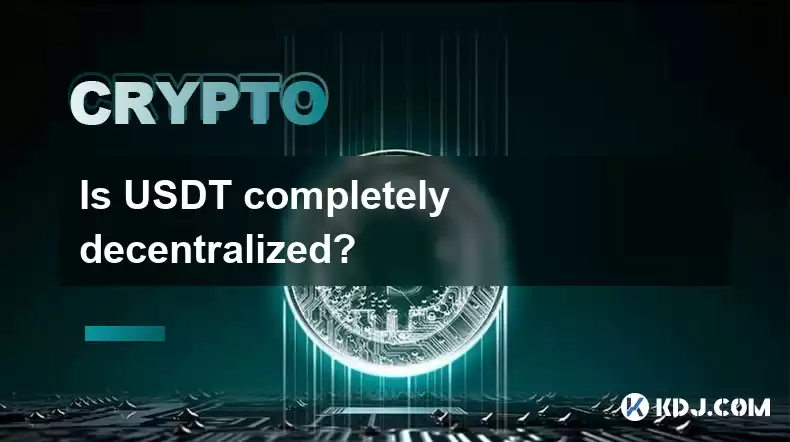
- USDT, while aiming for decentralization through its reserve backing, operates on centralized exchanges and platforms.
- The degree of decentralization is debated, with critics highlighting Tether's centralized control over its reserves.
- Transparency concerns surrounding USDT's reserves impact its perceived decentralization.
- Future developments in blockchain technology may offer solutions to enhance USDT's decentralization.
The question of whether Tether (USDT), the world's largest stablecoin, is truly decentralized is a complex one, sparking ongoing debate within the cryptocurrency community. While proponents point to its purported backing by reserves, critics argue that its operational structure and lack of full transparency hinder its claim to decentralization. The core of the issue lies in the tension between the desire for a stable, reliable asset and the inherent characteristics of a decentralized system.
Decentralization, in the cryptocurrency context, implies a distributed network with no single point of control. Bitcoin, for example, exemplifies this ideal through its peer-to-peer network and distributed ledger. USDT, however, operates differently. While Tether claims its tokens are backed by equivalent reserves of fiat currency and other assets, these reserves are managed by Tether Limited, a centralized entity. This centralized control is a major point of contention.
The management of USDT's reserves is a critical aspect influencing its level of decentralization. Tether Limited, a privately held company, is responsible for maintaining and reporting on the composition of these reserves. This centralized control contrasts sharply with the decentralized nature of cryptocurrencies like Bitcoin, where no single entity manages the network. The lack of complete transparency regarding the exact nature and composition of these reserves fuels skepticism.
Transparency is crucial in assessing the decentralization of any cryptocurrency, especially a stablecoin pegged to a fiat currency. Regular, independent audits of Tether's reserves are vital to build trust and verify the claims made by Tether Limited. However, the history of Tether's audits has been controversial, raising concerns about the accuracy and independence of these processes. The lack of consistent, publicly available and verifiable information hinders a complete understanding of the backing and consequently, its decentralized nature.
The operational aspect of USDT also contributes to the debate on its decentralization. Unlike many cryptocurrencies operating on public blockchains with transparent transaction histories, USDT transactions are primarily processed through centralized exchanges and platforms. This dependence on centralized entities undermines the concept of a truly decentralized system. While USDT exists on various blockchains, its issuance and management remain firmly within the control of Tether Limited.
The future of USDT's decentralization remains uncertain. Technological advancements in blockchain technology might offer pathways toward greater decentralization. For example, the development of decentralized stablecoins, which leverage smart contracts and on-chain governance mechanisms, could potentially address some of the criticisms leveled against USDT. These innovations might provide a more decentralized alternative, although challenges related to scalability and stability still exist.
Common Questions and Answers:Q: What are the reserves backing USDT?A: Tether claims that USDT is backed by reserves of fiat currency (primarily US dollars), commercial paper, treasury bills, and other assets. However, the exact composition and verification of these reserves remain a subject of ongoing debate and scrutiny.
Q: How does USDT's centralized nature impact its stability?A: The centralized control over USDT's reserves introduces a single point of failure. If Tether Limited faces financial difficulties or engages in questionable practices, it could potentially impact the stability and value of USDT. This is in stark contrast to a truly decentralized system where no single entity holds ultimate control.
Q: Are there decentralized alternatives to USDT?A: Yes, several projects are exploring decentralized stablecoin models, aiming to eliminate the centralized control aspects. These often utilize algorithmic mechanisms or over-collateralization strategies to maintain price stability. However, these alternatives still face technological and economic challenges.
Q: Why is transparency so important for USDT's decentralization?A: Transparency is crucial for building trust and accountability. Openly disclosing the composition and audit trails of USDT's reserves would alleviate concerns about its backing and strengthen the case for its claimed stability. Without this transparency, the centralized nature of its management remains a significant impediment to its claim of decentralization.
Q: Can USDT truly be considered a decentralized cryptocurrency?A: Given its centralized issuance, management of reserves by Tether Limited, and reliance on centralized exchanges for transaction processing, USDT cannot be considered completely decentralized in the same way as Bitcoin or other cryptocurrencies with truly distributed networks. The degree of decentralization remains a matter of ongoing discussion and interpretation.
Disclaimer:info@kdj.com
The information provided is not trading advice. kdj.com does not assume any responsibility for any investments made based on the information provided in this article. Cryptocurrencies are highly volatile and it is highly recommended that you invest with caution after thorough research!
If you believe that the content used on this website infringes your copyright, please contact us immediately (info@kdj.com) and we will delete it promptly.
- Work Dogs Unleashes TGE Launch, Sets Sights on Mid-2026 Listing & Ambitious $25 Token Target
- 2026-01-31 15:50:02
- WD Coin's TGE Launch Ignites Excitement: A Billion Tokens Set to Hit the Market
- 2026-01-31 16:10:02
- Royal Mint Launches Interactive £5 Coin for a Thrilling Code-Breaker Challenge
- 2026-01-31 16:10:02
- Crypto, AI, and Gains: Navigating the Next Wave of Digital Assets
- 2026-01-31 15:50:02
- Coin Nerds Forges Trust in the Digital Asset Trading Platform Landscape Amidst Evolving Market
- 2026-01-31 16:05:01
- Blockchains, Crypto Tokens, Launching: Enterprise Solutions & Real Utility Steal the Spotlight
- 2026-01-31 12:30:02
Related knowledge
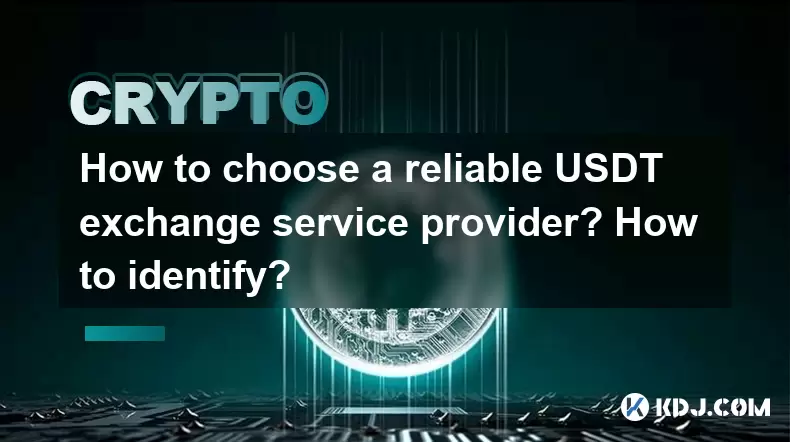
How to choose a reliable USDT exchange service provider? How to identify?
Jun 12,2025 at 03:15pm
Understanding the Role of USDT in Cryptocurrency TradingUSDT (Tether) is one of the most widely used stablecoins in the cryptocurrency market. It is d...
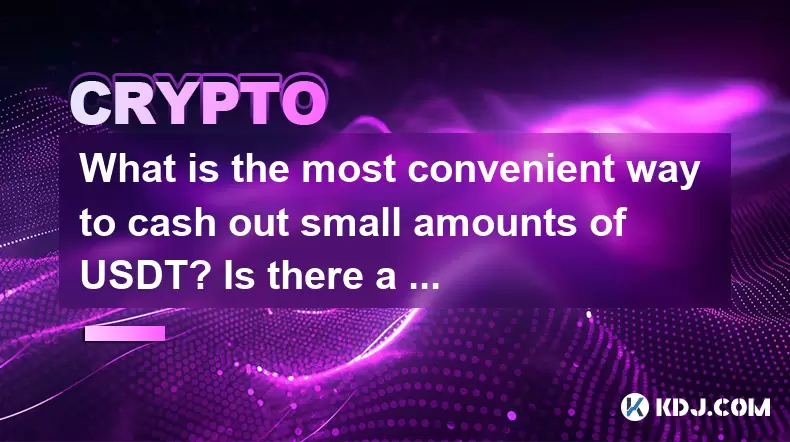
What is the most convenient way to cash out small amounts of USDT? Is there a shortcut?
Jun 11,2025 at 11:00pm
Understanding the Need to Cash Out Small USDT AmountsCashing out small amounts of USDT can be a challenge for many crypto users. Traditional methods o...
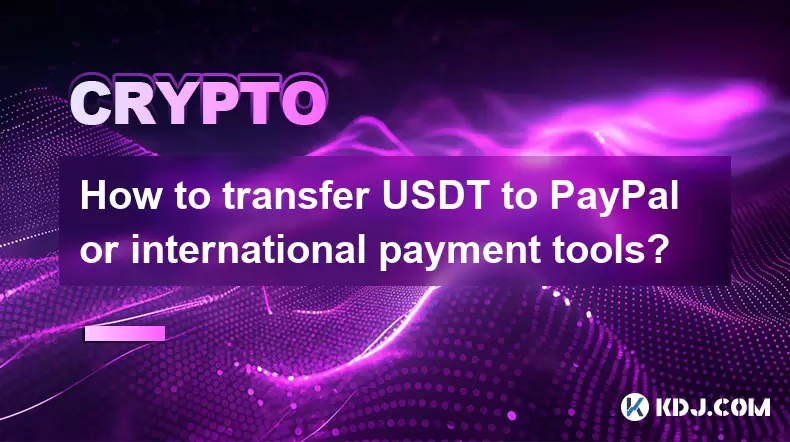
How to transfer USDT to PayPal or international payment tools?
Jun 15,2025 at 05:28am
Understanding the Basics of USDT and PayPal IntegrationUSDT (Tether) is a stablecoin pegged to the US dollar, offering blockchain-based value transfer...
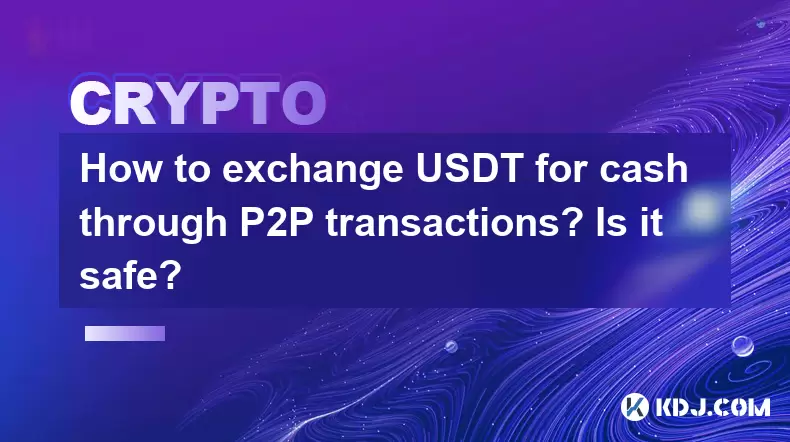
How to exchange USDT for cash through P2P transactions? Is it safe?
Jun 18,2025 at 07:56am
Understanding USDT and P2P TransactionsTether (USDT) is a stablecoin pegged to the value of the US dollar, making it a popular choice for users who wa...
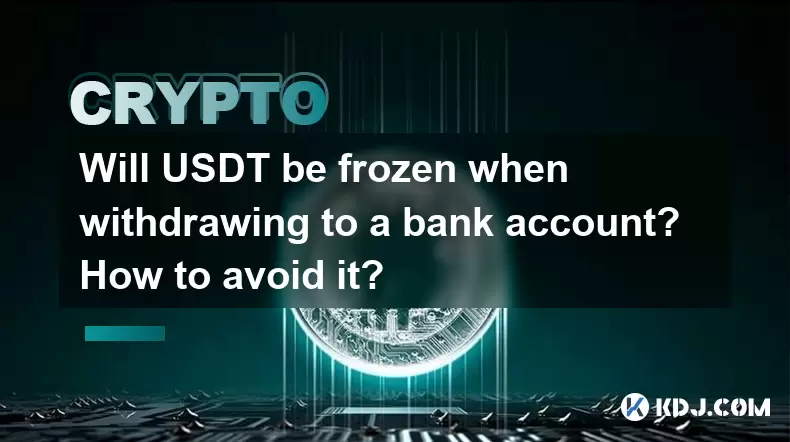
Will USDT be frozen when withdrawing to a bank account? How to avoid it?
Jun 15,2025 at 10:03am
Understanding USDT Withdrawals and Bank Account Freezing RisksWhen users decide to withdraw USDT (Tether) to a bank account, one of the most common co...
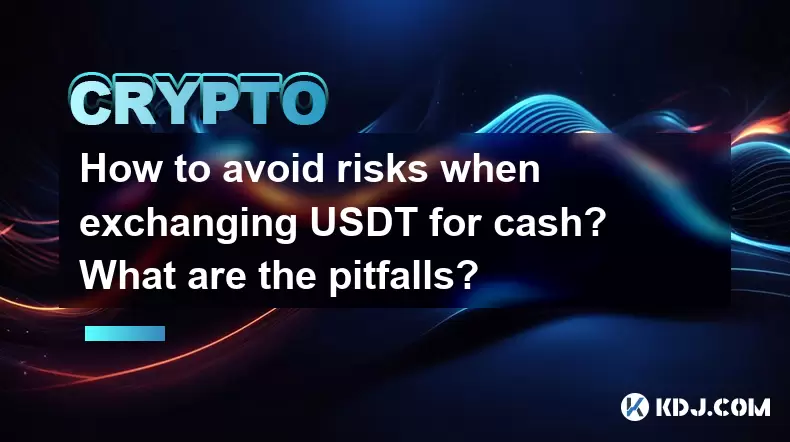
How to avoid risks when exchanging USDT for cash? What are the pitfalls?
Jun 11,2025 at 08:14pm
Understanding the Risks of Exchanging USDT for CashWhen exchanging USDT (Tether) for cash, users must be aware of the potential risks involved. As a s...

How to choose a reliable USDT exchange service provider? How to identify?
Jun 12,2025 at 03:15pm
Understanding the Role of USDT in Cryptocurrency TradingUSDT (Tether) is one of the most widely used stablecoins in the cryptocurrency market. It is d...

What is the most convenient way to cash out small amounts of USDT? Is there a shortcut?
Jun 11,2025 at 11:00pm
Understanding the Need to Cash Out Small USDT AmountsCashing out small amounts of USDT can be a challenge for many crypto users. Traditional methods o...

How to transfer USDT to PayPal or international payment tools?
Jun 15,2025 at 05:28am
Understanding the Basics of USDT and PayPal IntegrationUSDT (Tether) is a stablecoin pegged to the US dollar, offering blockchain-based value transfer...

How to exchange USDT for cash through P2P transactions? Is it safe?
Jun 18,2025 at 07:56am
Understanding USDT and P2P TransactionsTether (USDT) is a stablecoin pegged to the value of the US dollar, making it a popular choice for users who wa...

Will USDT be frozen when withdrawing to a bank account? How to avoid it?
Jun 15,2025 at 10:03am
Understanding USDT Withdrawals and Bank Account Freezing RisksWhen users decide to withdraw USDT (Tether) to a bank account, one of the most common co...

How to avoid risks when exchanging USDT for cash? What are the pitfalls?
Jun 11,2025 at 08:14pm
Understanding the Risks of Exchanging USDT for CashWhen exchanging USDT (Tether) for cash, users must be aware of the potential risks involved. As a s...
See all articles





















![Ultra Paracosm by IlIRuLaSIlI [3 coin] | Easy demon | Geometry dash Ultra Paracosm by IlIRuLaSIlI [3 coin] | Easy demon | Geometry dash](/uploads/2026/01/31/cryptocurrencies-news/videos/origin_697d592372464_image_500_375.webp)




















































